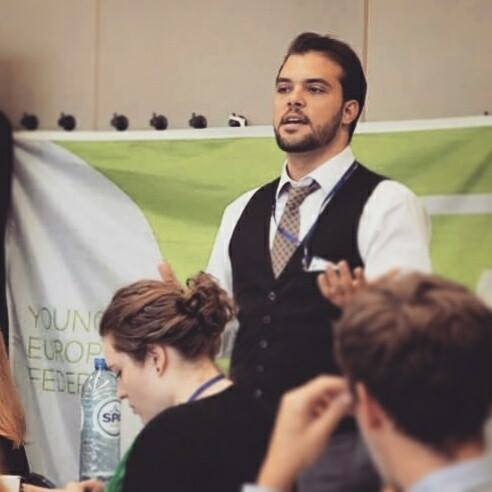
1.The European Union has often been criticized as being distant and bureaucratic. What room is there for young people in the European project?
This is an interesting question, as it allows me to present two perspectives, if you may: that of an employee of the European institutions (my day job), and that of the activist. The EU is indeed, to a wide extent, distant. What we often note, as federalists, is that while there is a shared sentiment of “European-ness”, there is still a lack of a proper “European demos”: a full-blown European people (in the political science sense), a citizenry going beyond “just” formal rights. This is improving, obviously, particularly in later years, but we still have some way to go. We, young federalists, are sort of an avant-garde in this sense, working every day to help creating this “demos”.
So, when you ask if there is space for young people in the European project, the answer is definitely yes – but also not really. Yes, there are formal means, set up by and with the European institutions, to make our voice as young people heard: think of the Structured Dialogue or the programme committee of Erasmus+, or the preferential relationship the Commission entertains with the Youth Forum, of which JEF is a proud and valued member.
Yet, at the same time, these are spaces that are offered or used mostly by highly-educated, engaged, active youth. There is a whole lotta youth (cit.) that is left out of these processes. This youth is the youth that suffered and suffers more from the economic and financial crisis, from social exclusion, from the short reach of the political debate. In order to reach out to this youth and for this youth to have its place in the European project, we need to start re-thinking the way we work – as a youth and political organisation, and as European institutions. At the same time, we need to realise that change and participation aren’t just on offer like a self-service canteen: if we want to be part of the European project, we need to own it, we need to fight for it, and we need to take the space that is ours, not ask for it.
2.What are the areas in which the Union needs to extend its cooperation immediately and what are the areas in which it needs to do so over the longer term?
Well, I would say we need to specify further: first, what are the policy areas that need to be urgently put under EU competence, and which are the ones that are less urgent; but secondly, which are the ones that realistically can be put under EU competence right away, and which are the ones that will take more time. So, a distinction between political urgency and political viability.
What matters need to be urgently tackled at EU level, then? I think the answer here is to a wide extent uncontroversial: we need to address European citizens’ most pressing concerns. The main problem I see with the EU today, however, is that citizens express their preferences over EU policy in polls (like the Eurobarometer) that are in no way a substitute for democratic processes. It’s the lack of a European demos I was referring to earlier, which makes the whole process of determining “where to integrate further” complicated and – to some extent – lacking legitimacy. There is but one way to make the EU a project for and by citizens, that answers their needs and doesn’t give in to Member States’ bargaining: that is to provide the EU with a clear constitutional order, right now. A European constituent process will enshrine in a Basic Law what exactly peace, democracy, subsidiarity, the Rule of Law and solidarity mean for EU citizens, and how the EU should look like to ensure these basic values and achieve its policy objectives.
Is there the political will on the part of Member States to launch such a process, is there a shared awareness on the part of citizens of the urgency of such constituent process? I doubt it, unfortunately.
Which is why, as JEFers, we’ll need to practice a sort of “constitutional gradualism”, where we advocate for the transfer at European level or those competences that are necessary to complement existing policy areas, in which citizens require a more decisive response and transparent chain of responsibility; and we should advocate for doing so in a “federal manner”, whereby Member States relinquish veto rights of any kind. To a wide extent, those policy areas are already clearly identified.
The Schengen area needs to be complemented with a European asylum policy and a single (external) border policy. To ensure the security of our citizens we must strengthen the European Counter-Terrorism Centre within Europol and the European agency for Cybersecurity, while launching and expanding further the duties of the European Public Prosecutor Office. The Euro economy is more solid today than it was before the crisis, yet it still need to be provided with a budget with a macroeconomic stabilisation function, financed by “own resources” – taxes levied at EU/Eurozone level in areas of clear EU competence.
Our economic and social systems need to be made fit for the challenges posed by technological process and globalization, thereby safeguarding the internal order. Finally, in the short term, the establishment of a single EU foreign policy and a European Defence Union will take roots by creating a sort of “Single Market of Defence”, pooling investments, research and procurements.
3.What is the most radically federalist position you take, in comparison with most pro-Europeans?
Being a federalist is already quite “radical” in comparison to the general pro-European sentiment. “Europeanism” as a concept is vague and, more often than one would hope, prone to cross over into European nationalism. This is not what we stand for as an organisation.
Being a European federalist means, to me, standing for two things. First, understanding the fight for a European Federation as a Constituent struggle: ahead of being an intellectual argument over which policy areas should be brought at EU level, it’s about establishing a democratic system of Government for Europe. Secondly, the understanding that the European federation is only an intermediate step before a World Federation. A European Federation is not established in opposition to other macro-regional powers, but to lead the way towards global integration and world peace.
4.Should JEF become more politically involved, actively pushing for a federalist agenda during the next European elections in 2019, or should it move toward a more social role in establishing networks of likeminded Europeans across the Member States?
The two aspects are not easily split. JEF is a political organisation, whose goal is to promote federalism and fight for a federal Europe. As a political organisation, it has a more or less well-defined idea on how European public life, the European “polity” should be organised. This is already a social role in itself, finding the best rules that allow citizens to live together peacefully and democratically. And just as naturally, those who share this view of Europe, a federalist perspective, find in JEF a competent and fun organisation. The quality of discussions and resolutions we adopt is extremely high. All the same, the quality of the parties during the statutory meetings or the seminars, and the #JEFspirit uniting us all are extremely competitive compared to other youth organisations. ;)
5.What answer can the EU, and by extension JEF, give to the many movements for independence that we can see springing up, the most obvious example being Catalonia? Most of these movements definitely want to continue being part of the EU.
Broadly speaking, independence movements are born because of the will of a community of people to organize itself as a “nation”, whatever the reasons. One can therefore qualify independentist movements as a form of nationalism, thus counter to our beliefs as federalists. One should, however, consider the lesson of History and the role Nationalism has played in the 18th and 19th century as a force of liberation of people against the big European empires. Those are also the grounds on which the de-colonisation process was conducted, and on which the UN today establishes the right to self-determination.
Legally speaking, then, do we have a similar situation in Europe, and particularly in Catalonia? Not really. There is wide agreement that the Spanish Constitution doesn’t in itself violate human rights: there is no discrimination of Catalan identity as there has been in darker times of Spanish history, and the “plurinational” dimension of Spain allows for a large degree of autonomy of regions like Catalonia and the Basque Country. Beyond the legal level, however, we must consider the emotional and political dimension of the Catalan issue – and of any independentist movement. The Catalan issue is infused with emotions on both sides. Catalanists claimed to exert a vague, unconfirmed “will of the people”. Falangist symbols and chants reappeared among the ranks of (a minority of) supporters of Spanish unity. This kind of nationalist rhetoric is in direct opposition to the basic principles of European federalism.
There is, then, a political dimension to the Catalan issue and to all independence movements, that elevates them to European issues, rather than merely internal. There must be a reason for the increase in support of independence movements we’ve been experiencing in later years, which has run in parallel to the increase in support for populist movements.
The economic and financial crisis has exposed the drawbacks of globalisation, and the inability for the Nation-State to respond to it. Instead of accepting the challenge, centralised State-like entities have responded with more of the same, muddling through, mistaking the Rule of Law with the “Rule by Law”, or even ignoring the issues altogether. What this proves instead, is that we need political integration at all levels in order to govern globalisation and for society to be inclusive, while allowing the flourishing of plural identities. Cities and regions are increasingly important to provide good governance structures, as are macro-regional and global cooperation and integration, all at the expenses of the Nation-State. Until the EU remains the intergovernmental behemoth it is, the forces of centralisation will not be able to understand the evolution of society, and we will see more Catalonia springing up.
6.It can be said that young people have the most to gain or lose during every election, as their lives will be impacted for the longest period of time by any choice. How will Europe and JEF look in two years?
As I have already mentioned in my candidacy, Europe and JEF are very similar. The various (Member) States and national sections have different needs, different challenges to respond to, and different political priorities. For the Western Balkans the priority is EU accession, for the Eurozone it is reinforcing the institutional framework within which the common currency is set, and so on. All the same, I believe that in the next two years both Europe and JEF should concentrate a bit less on policy design, and a bit more on politics, on the grand bargain. There is no “make it or break it” moment – Juncker tried that and it didn’t quite work, did it? – but rather a window of opportunity that is rapidly closing. Geopolitical instability at our doorstep.
Our own internal issues with Hungary and Poland backsliding on democratic standards, and the risk of a suspended constitutional conflict in Catalonia. Economic growth is back, albeit still weak and not having fully recouped from the social consequences of the crisis. A momentary break in the surge of populist, radical right parties provided us some relief, although Austrian and Czech elections shed some shadows on the political outlook.
So the threats and weaknesses on one side, and the opportunities on the other, put us in the position to exploit the “narrow path” in between these to fully harness the strengths we have as Europeans, and to come out with a renewed European social contract. The same goes for JEF, I believe that the next two years can bring us closer and make this organization more inclusive. Will it happen, though? That’s up to us, as JEFers and citizens.
The future of Europe is nothing new for us. The future of Europe has been our job and our mission for the past 45 years – or 70, if you may. In the next two years our vision and resolve will be put to the test.
You can read more about Sebastiano Putoto here.


Follow the comments: |
|
